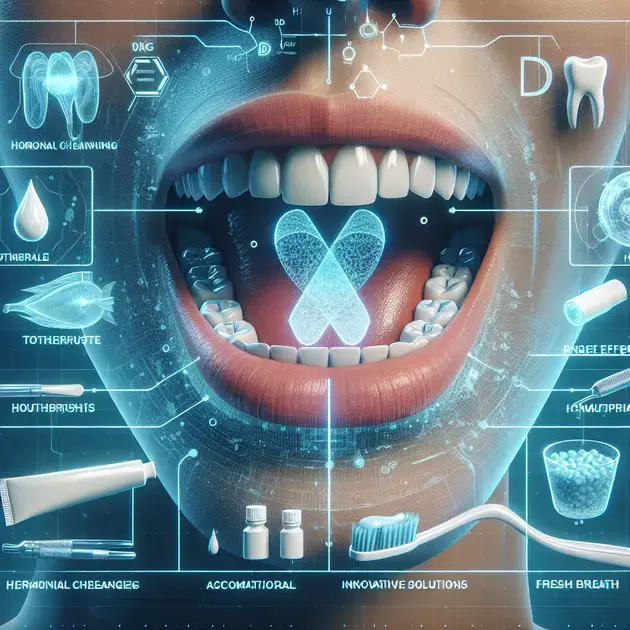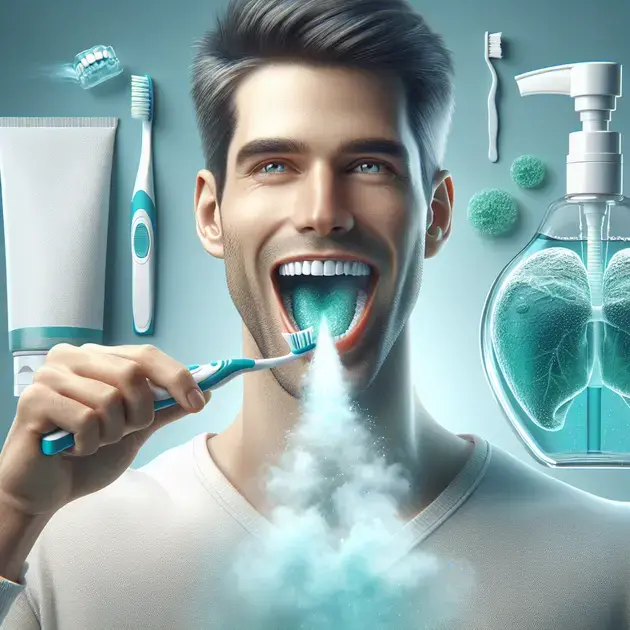Combat bad breath and feel confident all day long are two key components to maintaining good oral hygiene. Bad breath, also known as halitosis, can be caused by various factors such as poor dental habits, certain foods, or underlying health issues. It can be embarrassing and affect self-esteem, making it essential to address the root cause.
By following a proper oral care routine, you can combat bad breath and feel confident throughout the day. Brushing your teeth twice a day, flossing regularly, and using mouthwash are simple yet effective ways to keep your breath fresh. Additionally, staying hydrated and chewing sugar-free gum can help stimulate saliva production, reducing the risk of bad breath. Incorporating these habits into your daily life can make a significant difference in your overall oral health and confidence levels.

Addressing Bad Breath with Confidence: Understanding the Causes and Solutions
Bad breath, also known as halitosis, can be caused by various factors such as poor oral hygiene, certain foods, smoking, dry mouth, or underlying health issues. To address bad breath confidently, it is essential to understand its root causes and implement effective solutions.
Causes of Bad Breath:
1. Poor Oral Hygiene: Not brushing and flossing regularly allows bacteria to accumulate in the mouth, leading to bad breath.
2. Food Choices: Foods with strong odors like garlic and onions can contribute to temporary bad breath.
3. Smoking and Tobacco Use: These habits not only stain the teeth but also lead to persistent bad breath.
4. Dry Mouth: Saliva helps cleanse the mouth, so a lack of it due to dehydration or certain medications can result in bad breath.
5. Health Conditions: Conditions such as gum disease, respiratory infections, or digestive issues can also cause bad breath.
Solutions for Bad Breath:
1. Practice Good Oral Hygiene: Brush your teeth at least twice a day and floss daily to remove food particles and bacteria.
2. Stay Hydrated: Drinking plenty of water helps maintain saliva production, preventing dry mouth.
3. Use Mouthwash: Antiseptic mouthwashes can help kill bacteria and freshen breath, but avoid alcohol-based ones that can worsen dry mouth.
4. Visit the Dentist: Regular dental check-ups can identify and treat any oral health issues contributing to bad breath.
5. Healthy Lifestyle: Eating a balanced diet, quitting smoking, and managing underlying health conditions can also improve bad breath.
Mastering Oral Hygiene for All-Day Freshness: Effective Tips for Combatting Bad Breath
Maintaining optimal oral hygiene is key to combating bad breath and achieving all-day freshness. By following a few simple but effective tips, you can master your oral care routine and keep your breath fresh throughout the day.
Effective Tips for Combatting Bad Breath:
1. Brush Properly: Use a fluoride toothpaste and brush your teeth, tongue, and gums at a 45-degree angle in gentle circular motions.
2. Don’t Forget to Floss: Regular flossing removes plaque and food debris between teeth that brushing alone can’t reach.
3. Clean Your Tongue: Use a tongue scraper or your toothbrush to gently clean the surface of your tongue where bacteria can accumulate.
4. Stay Consistent: Maintain a regular oral hygiene routine by brushing and flossing at least twice a day, preferably after meals.
5. Consider Mouthwash: A fluoridated or antibacterial mouthwash can enhance your oral hygiene routine and freshen your breath.
Boosting Confidence Through a Healthy Mouth: The Impact of Oral Care on Self-Esteem
A healthy mouth not only contributes to physical well-being but also plays a significant role in boosting self-esteem and confidence. Understanding how oral care influences your overall self-perception can empower you to prioritize your dental health for a more confident smile.
The Impact of Oral Care on Self-Esteem:
1. Positive Self-Image: Maintaining good oral hygiene fosters a positive self-image, as fresh breath and a bright smile enhance your overall appearance.
2. Social Confidence: Feeling secure about your oral health allows you to engage in social interactions without the worry of bad breath or dental issues affecting your confidence.
3. Professional Success: A healthy smile can positively impact career prospects, as confidence in your appearance can make a strong impression in professional settings.
4. Emotional Well-Being: Good oral care promotes emotional well-being by reducing the risk of dental problems that may cause pain, discomfort, or embarrassment.
5. Overall Happiness: Taking care of your oral health not only benefits your physical well-being but also contributes to your overall happiness and quality of life.

Effective Remedies for Combatting Halitosis
Halitosis, commonly known as bad breath, can be a source of embarrassment and discomfort. Fortunately, there are effective remedies that can help combat this issue. One simple yet crucial step is to maintain good oral hygiene. Brushing your teeth twice a day, flossing regularly, and using mouthwash can prevent the buildup of bacteria that cause bad breath.
Another remedy for halitosis is staying hydrated. Drinking an adequate amount of water throughout the day helps to keep your mouth moist and prevents dry mouth, a common cause of bad breath. Additionally, including more fruits and vegetables in your diet can also help freshen your breath naturally.
If you are looking for a quick fix for bad breath, consider using sugar-free gum or mints. These products can temporarily mask odors and stimulate saliva production, which helps wash away bacteria in your mouth. However, it is important to address the root cause of halitosis for long-term relief.
In some cases, bad breath may be a symptom of an underlying dental or medical condition. Visiting your dentist regularly for check-ups and cleanings can help identify any issues early on. They can provide professional treatment and recommendations to improve your oral health and eliminate bad breath.
Overall, by incorporating good oral hygiene practices, staying hydrated, and seeking professional help when needed, you can effectively combat halitosis and enjoy fresh breath confidently.
Innovative Solutions to Tackle Bad Breath Woes
Dealing with bad breath can be frustrating, but there are innovative solutions available to help tackle this common issue. One creative approach is using probiotics specifically designed to promote oral health. These beneficial bacteria can help balance the microbiome in your mouth, reducing the production of foul-smelling compounds.
Another cutting-edge solution for bad breath is incorporating activated charcoal products into your oral care routine. Activated charcoal has natural detoxifying properties that can help absorb toxins and odors in your mouth, providing a fresh and clean feeling. From toothpaste to mouthwash, there are various charcoal-based products to choose from.
Technology has also played a role in developing innovative solutions for bad breath. Smart toothbrushes equipped with sensors and real-time feedback can help ensure thorough cleaning and effective plaque removal, which are essential for preventing bad breath. These smart devices can track your brushing habits and provide personalized recommendations for improving oral hygiene.
For individuals looking for eco-friendly options, there are now biodegradable dental products available in the market. These sustainable alternatives help reduce plastic waste and contribute to environmental conservation while still effectively addressing bad breath concerns. Making a conscious choice to switch to eco-friendly oral care products can benefit both your oral health and the planet.
By exploring these innovative solutions and incorporating them into your daily oral care routine, you can effectively tackle bad breath woes and achieve a fresh and healthy smile.
The Connection Between Hormonal Changes and Oral Odor
Hormonal changes can have a significant impact on oral health, including the presence of oral odor. During puberty, pregnancy, and menopause, fluctuations in hormone levels can lead to changes in saliva production and composition, affecting the balance of bacteria in the mouth.
Increased hormonal activity can also contribute to dry mouth, a common condition that reduces saliva flow and creates an environment for bacteria to thrive. This can result in the development of oral odor and an increased risk of dental issues such as cavities and gum disease.
Furthermore, hormonal changes can influence taste perception, appetite, and immune response, all of which play a role in maintaining oral health. It is essential for individuals experiencing hormonal fluctuations to pay extra attention to their oral hygiene routine and seek professional guidance if needed.
Managing hormonal changes through proper nutrition, stress management, and regular exercise can help support overall oral health and reduce the likelihood of oral odor. Additionally, consulting with a healthcare provider or dentist can provide personalized recommendations for addressing hormonal-related oral health issues.
By recognizing the connection between hormonal changes and oral odor, individuals can take proactive steps to maintain a healthy mouth and fresh breath despite the hormonal fluctuations they may experience.
Conclusion
Halitosis, commonly known as bad breath, can be a source of embarrassment and discomfort. By maintaining good oral hygiene practices such as brushing your teeth twice a day, flossing regularly, and using mouthwash, you can effectively combat the buildup of bacteria that causes bad breath. Additionally, staying hydrated by drinking an adequate amount of water throughout the day and including more fruits and vegetables in your diet can help naturally freshen your breath.
Exploring innovative solutions like probiotics designed for oral health, activated charcoal products, and smart toothbrushes can provide effective ways to tackle bad breath issues. These modern approaches help balance the microbiome in your mouth, absorb toxins and odors, and ensure thorough cleaning for fresh breath. Moreover, opting for eco-friendly dental products contributes to both oral health and environmental conservation.
Understanding the connection between hormonal changes and oral odor is crucial for maintaining a healthy mouth. Hormonal fluctuations during puberty, pregnancy, or menopause can impact saliva production, creating an environment for bacteria to thrive. By managing hormonal changes through proper nutrition, stress management, and seeking professional guidance, individuals can support overall oral health and reduce the risk of oral odor despite hormonal fluctuations.



